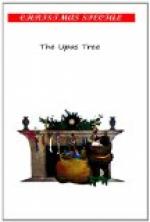At first sight, its shining surface appeared perfect as ever. Then, looking very closely, and knowing exactly where to look, Ronnie saw a place just above the f hole on the right, where a blow had evidently been struck deeply into the ’cello. A strip of wood, four inches long, by one inch wide, had been let in, then varnished so perfectly that the mend—probably the work of a hundred years ago—could only be seen in a good light, and by one who knew exactly where to look.
Ronnie stood with grave face gazing at the Infant.
What did it all mean?
He remembered with the utmost vividness every detail of the scene in the mirror.
Had he thought-read from his ’cello the happenings of a century before? Had it transmitted to his over-wrought brain, the scene in which it had once played so prominent a part?
Had it, before then, in the Leipzig flat, imparted to Aubrey Treherne—unconsciously to himself—an accurate mental picture of its former owner?
Ronnie mused on this, and wondered. Then the desire rose strong within him to hear once more the golden voice of the Infant, even at the risk of calling up again those ghostly phantoms of a vanished past.
He drew the Florentine chair into the centre of the room.
He took his seat on the embossed leather of crimson and gold.
He glanced at his reflection. His face was whiter than it had been five weeks ago, when he returned, deep bronzed, from Africa. His hair, too, was longer than it ought to be; though not so long as the heavy black locks of the ’cellist of that past reflection.
Ronnie’s rough tweed suit and shooting boots, were a curious contrast to the satin knee-breeches, silken hose, and diamond shoe-buckles he remembered in his vision; yet his manner of holding the ’cello, assumed without conscious thought, and the positions of his knees and feet, were so precisely those of that quaint old-time figure, that Ronnie never doubted that when he raised the bow and his fingers bit into the strings, the flood of harmony would be the same.
He waited for the strong tremor to seize his wrist.
It did not come.
He sounded the four open strings, slowly, one after the other.
Yes, the tones were very pure, very rich, very clear.
Then he took courage, pressed his fingers into the finger-board, and began to play.
Alas, poor Infant of Prague!
Alas, poor born musician, who preferred doing things he had never learned to do!
The exquisite rise and fall of harmony, came not again.
Bitterly disappointed, Ronnie waited, staring into the mirror.
But a rather weary, very lonely, and exceedingly modern young man stared back at him.
At last he realised that he could no longer play the ’cello by inspiration. So he began very carefully feeling for the notes.




